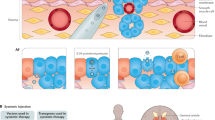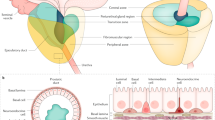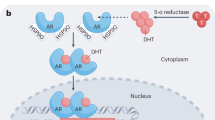Abstract
Prostate cancer is the third most common cancer, accounting for one in 10 cancer diagnoses in men worldwide during 2000. Despite this high burden of morbidity, there is a lack of curative treatments for locally advanced and metastatic disease. Good anatomical accessibility of the prostate combined with substantial molecular understanding of the disease makes prostate cancer an attractive target for gene therapy. Considerable progress has been made in the development of suitable gene transfer vectors and prostate-targeting strategies. Therapeutic approaches being explored fall into two broad categories: corrective and cytoreductive/cytolytic. There are currently 63 prostate cancer gene therapy clinical trials based on these approaches registered in the United States and United Kingdom. Although significant hurdles remain to be overcome, early clinical trial results are encouraging, suggesting that gene therapy may become an important treatment option for prostate cancer.
This is a preview of subscription content, access via your institution
Access options
Subscribe to this journal
Receive 4 print issues and online access
$259.00 per year
only $64.75 per issue
Buy this article
- Purchase on Springer Link
- Instant access to full article PDF
Prices may be subject to local taxes which are calculated during checkout
Similar content being viewed by others
References
Ferlay J, Bray F, Pisani P, Parkin DM . GLOBOCAN 2000: Cancer Incidence, Mortality and Prevalence Worldwide, Version 1.0. IARC CancerBase No. 5. IARC Press: Lyon, 2001.
Mabjeesh NJ, Zhong H, Simons JW . Gene therapy of prostate cancer: current and future directions. Endocr Relat Cancer 2002; 9: 115–139.
Steiner MS, Gingrich JR, Chauhan RD . Prostate cancer gene therapy. Surg Oncol Clin N Am 2002; 11: 607–620.
Nicholson B, Theodorescu D . Molecular therapeutics in prostate cancer. Histol Histopathol 2003; 18: 275–298.
Nelson PS et al. The prostate expression database (PEDB): status and enhancements in 2000. Nucleic Acids Res 2000; 28: 212–213.
Gardner TA, Sloan J, Raikwar SP, Kao C . Prostate cancer gene therapy: past experiences and future promise. Cancer Metastasis Rev 2002; 21: 137–145.
Berges RR et al. Cell proliferation, DNA repair, and p53 function are not required for programmed death of prostatic glandular cells induced by androgen ablation. Proc Natl Acad Sci USA 1993; 90: 8910–8914.
Lu Y . Viral based gene therapy for prostate cancer. Curr Gene Ther 2001; 1: 183–200.
Office of Biotechnology Activities, National Institutes of Health. Human Gene Transfer Protocols. 3 February 2004. Available from: http://www4.od.nih.gov/oba/rac/PROTOCOL.pdf (accessed 10 May 2004).
Bangma CH . Targeting of adenoviral vectors for gene therapy of prostate cancer. Prostate Cancer Prostatic Dis 2000; 3: 308–312.
Seymour LW et al. Adenovirus retargeting and systemic delivery. Ernst Schering Res Found Workshop 2003; 43: 107–114.
Latham JP, Searle PF, Mautner V, James ND . Prostate-specific antigen promoter/enhancer driven gene therapy for prostate cancer: construction and testing of a tissue-specific adenovirus vector. Cancer Res 2000; 60: 334–341.
Heidenberg HB et al. Alteration of the tumor suppressor gene p53 in a high fraction of hormone refractory prostate cancer. J Urol 1995; 154: 414–421.
Ko SC et al. Molecular therapy with recombinant p53 adenovirus in an androgen-independent, metastatic human prostate cancer model. Hum Gene Ther 1996; 7: 1683–1691.
Asgari K et al. Inhibition of the growth of pre-established subcutaneous tumor nodules of human prostate cancer cells by single injection of the recombinant adenovirus p53 expression vector. Int J Cancer 1997; 71: 377–382.
Chakravarti A et al. Loss of p16 expression is of prognostic significance in locally advanced prostate cancer: an analysis from the Radiation Therapy Oncology Group protocol 86-10. J Clin Oncol 2003; 21: 3328–3334.
Steiner MS et al. Adenoviral vector containing wild-type p16 suppresses prostate cancer growth and prolongs survival by inducing cell senescence. Cancer Gene Ther 2000; 7: 360–372.
Fujiwara T, Kataoka M, Tanaka N . Adenovirus-mediated p53 gene therapy for human cancer. Mol Urol 2000; 4: 51–54.
Ast G . Drug-targeting strategies for prostate cancer. Curr Pharm Des 2003; 9: 455–466.
Steiner MS, Anthony CT, Lu Y, Holt JT . Antisense c-myc retroviral vector suppresses established human prostate cancer. Hum Gene Ther 1998; 9: 747–755.
Harrington KJ et al. Gene therapy for prostate cancer: current status and future prospects. J Urol 2001; 166: 1220–1233.
Kerr DJ, Young LS, Searle PF, McNeish IA . Gene directed enzyme prodrug therapy for cancer. Adv Drug Deliv Rev 1997; 26: 173–184.
Cheon J et al. Adenovirus-mediated suicide-gene therapy using the herpes simplex virus thymidine kinase gene in cell and animal models of human prostate cancer: changes in tumour cell proliferative activity. BJU Int 2000; 85: 759–766.
Denny WA . Nitroreductase-based GDEPT. Curr Pharm Des 2002; 8: 1349–1361.
Bridgewater JA et al. The bystander effect of the nitroreductase/CB1954 enzyme/prodrug system is due to a cell-permeable metabolite. Hum Gene Ther 1997; 8: 709–717.
Bischoff JR et al. An adenovirus mutant that replicates selectively in p53-deficient human tumor cells. Science 1996; 274: 373–376.
Rodriguez R et al. Prostate attenuated replication competent adenovirus (ARCA) CN706: a selective cytotoxic for prostate-specific antigen-positive prostate cancer cells. Cancer Res 1997; 57: 2559–2563.
Gene Therapy Advisory Committee, Department of Health. Latest UK gene therapy research 1993–2003. 15 April 2004 Available from: http://www.advisorybodies.doh.gov.uk/genetics/gtac/genetherapyresearch1993to2003.pdf (accessed 10 May 2004).
Kaminski JM et al. Immunotherapy and prostate cancer. Cancer Treat Rev 2003; 29: 199–209.
Shalev M et al. Suicide gene therapy toxicity after multiple and repeat injections in patients with localized prostate cancer. J Urol 2000; 163: 1747–1750.
Herman JR et al. In situ gene therapy for adenocarcinoma of the prostate: a phase I clinical trial. Hum Gene Ther 1999; 10: 1239–1249.
Kubo H et al. Phase I dose escalation clinical trial of adenovirus vector carrying osteocalcin promoter-driven herpes simplex virus thymidine kinase in localized and metastatic hormone-refractory prostate cancer. Hum Gene Ther 2003; 14: 227–241.
James ND et al. A biodistribution study of adenovirus-delivered nitroreductase (Ad-NTR) in patients with operable prostate cancer. Proc Am Soc Clin Oncol 2003; 22: 204.
Palmer DH et al. Virus directed enzyme prodrug therapy: intratumoural administration of a replication-deficient adenovirus encoding nitroreductase to patients with resectable liver cancer. J Clin Oncol 2004; 22: 1546–1552.
DeWeese TL et al. A phase I trial of CV706, a replication-competent, PSA selective oncolytic adenovirus, for the treatment of locally recurrent prostate cancer following radiation therapy. Cancer Res 2001; 61: 7464–7472.
Teh BS et al. Combining radiotherapy with gene therapy (from the bench to the bedside): a novel treatment strategy for prostate cancer. Oncologist 2002; 7: 458–466.
Hall SJ et al. Cooperative therapeutic effects of androgen ablation and adenovirus-mediated herpes simplex virus thymidine kinase gene and ganciclovir therapy in experimental prostate cancer. Cancer Gene Ther 1999; 6: 54–63.
Author information
Authors and Affiliations
Corresponding author
Rights and permissions
About this article
Cite this article
Patel, P., Ashdown, D. & James, N. Is gene therapy the answer for prostate cancer?. Prostate Cancer Prostatic Dis 7 (Suppl 1), S14–S19 (2004). https://doi.org/10.1038/sj.pcan.4500743
Published:
Issue Date:
DOI: https://doi.org/10.1038/sj.pcan.4500743



